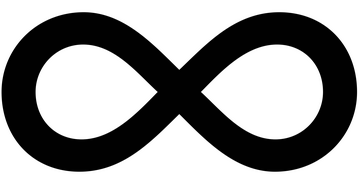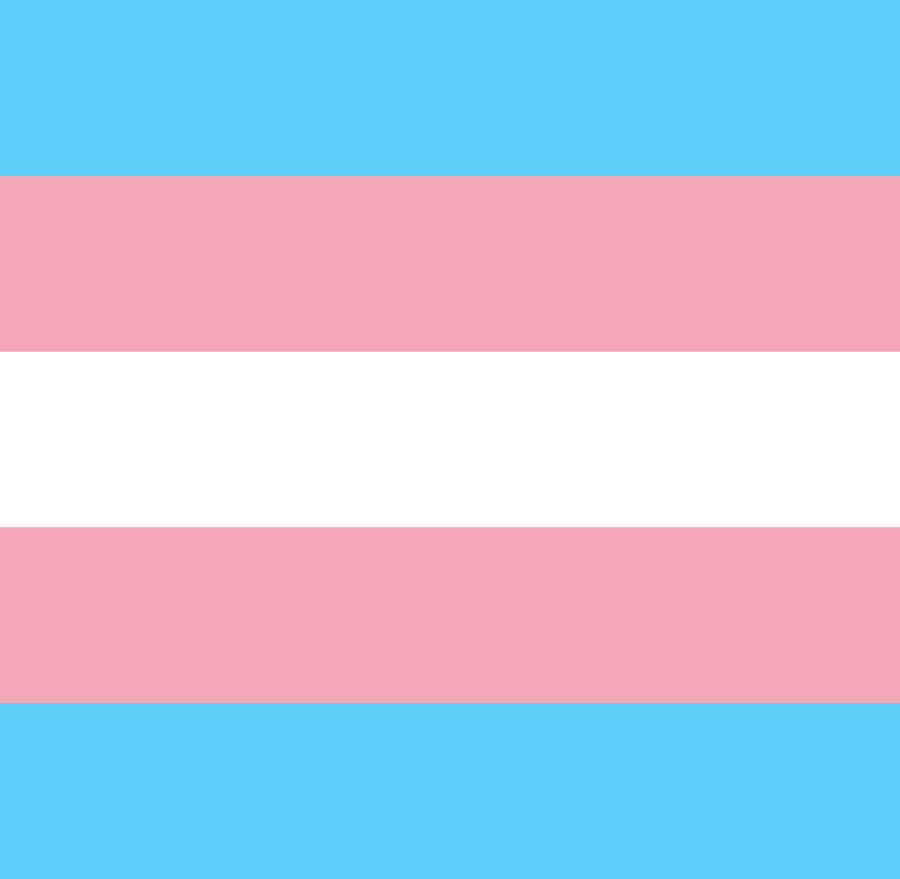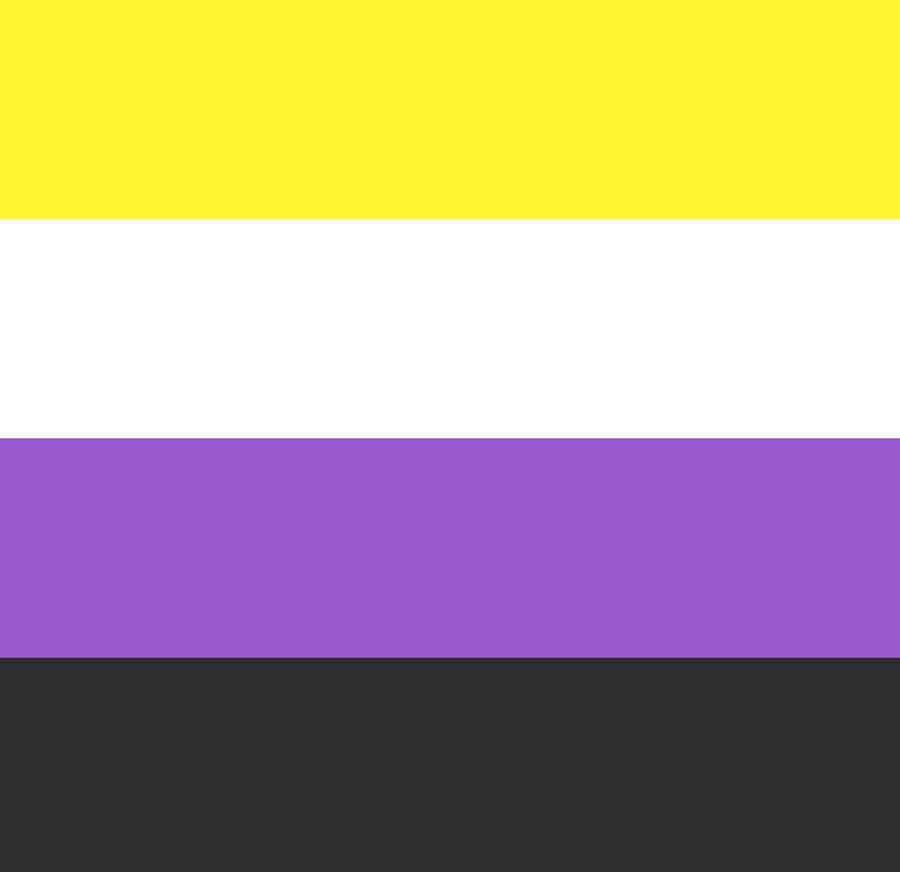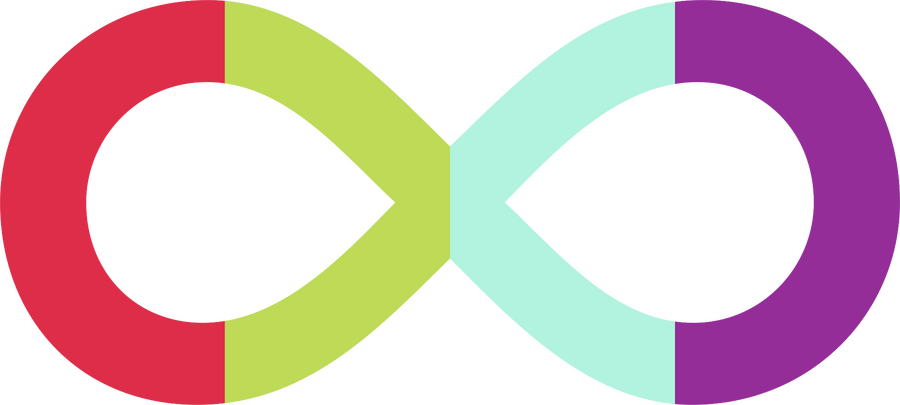
let's talk about: neurogenders
Why is everything a gender now? Are xenogenders only for ND people? Isn't that romanticizing illness?
Basic definitions
Let's start with some context.
Transgender: An umbrella term covering all gender identities or expressions that transgress or transcend society’s rules and concepts of gender. To be trans means to identify as a gender other than the gender one was assigned at birth. The category of transgender includes people who have the binary gender identities of female (transgender women) or male (transgender men). The transgender umbrella includes people with nonbinary gender identities. However, some nonbinary people may not call themselves transgender.
Nonbinary: Any gender identity which does not fit within the binary of male and female. A nonbinary person's gender may include ties to or portions of male or female, but someone counts as nonbinary as long as they're not 100% only of either.


Xenogender: A nonbinary gender identity that cannot be contained by human understandings of gender; more concerned with crafting other methods of gender categorization and hierarchy such as those relating to animals, plants, or other creatures/things. It’s mainly an umbrella term for genders with themes such as nouns, archetypes, synesthetic experiences, neurodivergences.
Neurogender: When one’s gender is linked to someone’s neurodivergency; a person’s perception of their gender influenced by them being neurodivergent. Both an identity and an umbrella term for genders that are limited to neurodivergent individuals. Some examples of neurogenders are gendernimius, fixigender, and borderfluid.
Not all neurogender identities may be xenogenders - For example, someone who identifies as a man for reasons connected to their neurodivergence wouldn't be xenogender, because "male" is not a xenogender; But their identity WOULD count as a neurogender one.
Pictured: The disability pride flag and one version of the mad pride flag.
Neurodivergence:
Variation in the human brain regarding sociability, learning, attention, mood and other mental functions; Being mentally ill, having suffered brain injury, a developmental disorder, etc. A wide-reaching umbrella term for people whose neurological development doesn't match the expected 'norm'. Someone who fits under this umbrella is neurodivergent (or ND).
Someone who doesn't have any of these conditions is neurotypical (or NT).
➥ Common Questions
Questions You May Have
"Do people actually identify this way?"
➜ Yes!
For one... The people who see out there, who coin neurogender terms and use them? They still exist offline.
Personally: Many people in my immediate friend group or who regularly interact with me use neurogender labels.
Statistically: The best figure of just how many people out there identify as neurogender is found in Cassian's Gender Census. Some details of past censuses can be found on nonbinary.org's page for neurogender; For example, it notes that in 2020, 0.2% of the results were "neurogender" (no specification beyond that).Neurogender is no doubt an uncommon identity, but this doesn't discount those who genuinely identify this way - They deserve respect and recognition.
"I don’t feel like a woman, but I know I’m not a man either. I now identify as genderqueer or non-binary. It wasn’t until partway through college, though, before I began to question what gender might mean to me, my explorations largely kindled by developing important relationships with many openly trans autistic people through my activism. [...] Being autistic doesn’t cause my gender identity, but it is inextricably related to how I understand and experience gender."
Gendervague: At the Intersection of Autistic and Trans Experiences, 2016.
Pictured: Lydia X. Z. Brown. Brown, born in 1993, is a public speaker, activist, and attorney (among many other things).Brown identifies as gendervague, which is a neurogender identity coined in 2014 on Tumblr.
➜ "Is this doing damage to REAL trans people?"
If you're asking this question, I want to ask one in return - What are you defining as a "real" trans person?
In your opinion, is someone only really trans/nonbinary if they have gender dysphoria and/or transition to a male/female goal? Neurogenders, for the record, say nothing about one's dysphoria, but The World Medical Association, The World Health Organization, The American Psychological Association, and many other sources agree that not all transgender people suffer from dysphoria, therefore it, and transitioning, are not a requirement for being trans.Is someone only really trans/nonbinary if they can pass? What about trans/nonbinary people who physically can never pass because of how their body is, or because they physically cannot bind/tuck, undergo hormone therapy, or have surgeries because of health conditions?In your opinion, is someone only really trans/nonbinary if how they describe/relate to their gender can "make sense"? To some cis people, just being binary trans (trans female/trans male) doesn't make any sense at all. To some cis people, being nonbinary at all doesn't make any sense.
Etc.It is important to understand that what one might think of when they think "real trans person" might be rooted in excluding a majority of the trans population.
The examples given above don't inherently have to do with what labels someone uses, but are often used (online) as reasons to discount the trans experience of many people. As if not being able to transition, bind, or not feeling dysphoria the same way other trans people do, are all things that prove that person isn't 'really' trans.In addition, I would like to add that I, the author of this Carrd, am an "official" "real" trans person. I'm officially diagnosed with gender dysphoria and recognized as transgender. I don't feel threatened whatsoever by ""weird"" genders, neopronouns, or nounself pronouns, etc, because I understand that this is just someone else's lived experience, and I think it's pretty cool that LGBTQ+ folk have continued to eschew the boundaries of language to invent new ways to refer to ourselves.
"Why identify this way?"
➜ From this list of examples:
Many people feel that they can describe their gender with nouns or other descriptors other than typical gender terms (male/female, masculine/feminine, neutral/nonbinary, etc). In the way that a nonbinary person may feel male-aligned or feminine-aligned, a nonbinary person could feel that the way they experience gender is more aligned with, say, an animal or a planet. They’re more easily able to explain the way their gender feels through an object, creature, archetype, etc. than through typical gender descriptors.
Someone may find it euphoric or easy to evoke something visual, aural, etc. as an explanation for their gender rather than trying to explain their more complex gendered feelings or fit into typical gender categories.
Neurodivergency can affect how one perceives gender in a variety of ways. maybe a synesthete has some sort of sensory experience related to their gender, or an autistic person can’t fit into typical gender categories because those categories make no sense to them, etc.
More potential examples:
Being an alter in a DID system with a very specific role/identity, to the point it defines gender as well.
Having synesthesia and experiencing tastes, smells, etc, when picturing one's gender.
Having a fluid gender that only changes or changes the most when you're experiencing certain symptoms.
➥ Common Anti-Neurogender Stances & Concerns
common anti-neurogender stances
"[Anything that uses the word "MOGAIs" or "MOGAI genders"]"
➜ MOGAI does not refer specifically to any kind of political stance or kind of gender - The phrase "MOGAI genders" has no real meaning because of the definition of MOGAI itself; Marginalized Orientations, Gender Alignments, Intersex. "MOGAI genders" would literally mean all nonbinary genders, and the same goes for "MOGAIs". When you talk about how you hate ~ the MOGAIs ~, you're literally just saying "I hate marginalized orientations, genders, and intersex." You're absolutely allowed to have criticism, but these phrasings ignore the fact that MOGAI is an acronym and just come out similar to saying "the LGBTs.""But neolabels/xenogenders/'MOGAI genders'/etc are why people don't take us seriously!"
➜ This is victim-blaming. Trying to blame other people who're trying to find terms to describe their gender/orientation/etc is a slippery slope, and trying to guilt people back into the closet to appease cishet people is never going to work. We do not exist to be palatable to them. This line of thinking is extremely dangerous, and it's been applied to every other identity.
"Autigender? You're making us all look stupid!"
"Agender? You can't not have a gender, you're making us all look stupid!"
"Transgender? No, you were assigned male/female at birth! You're making us all look stupid!"
Etc... Gatekeeping is the act of attacking the perceived "weakest link," and very quickly, that could be your identity. As a community, we need to stand together against transphobia and it's actual cause: Transphobes.Transphobia is not the fault of trans people, and it never will be.
"Neurogenders imply autistic/other ND people can't understand genders, therefore they're ableist."
➜ If one person identities as a neurogender, one person identifies as a neurogender. One person's identity doesn't imply anything about everyone in the group they belong to. There are ND people who feel they can define their genders using existing terms. There are ND people who don't feel that way.
We're allowed to discuss how our brains affect our lives, and that includes our gender terms. Gender is less biological and rigid than you think, and unsurprisingly, things determined in our brains can be affected by the way our brains work.
Telling them “no you’re not, you’re [insert other gender identity]” isn't helping anyone and is telling them that their lived experience isn’t happening, which is ableist.[If someone individually is trying to imply that all ND people can only use neurogender terms or something ridiculous like that, they're in the wrong of course - But in my 5-ish years of watching neolabel/MOGAI communities develop, I haven't actually seem people imply this. I've just seen neurotypicals tell neurodivergents that what they're experiencing isn't real.]
"But people who use neurogender labels are avoiding treatment!"
➜ You have no way of knowing that about someone - Identifying as a gender relating to a specific symptom or condition doesn't imply anything about a person, and no one is entitled to details about the mental illness of a stranger online. Don't armchair diagnose.
Neurodivergent people are allowed to acknowledge how our conditions affect our lives. That's all neurogender identities really are - Expressing how that individual relates to gender. Neurogender identities don't imply anything about how a person is coping with, receiving treatment for, or otherwise handling symptoms.
"But biology!"
➜ Gender is not determined by our body, and saying one's gender has a relation to [insert thing here] is not the same as making claims about their body.Here's the thing, though: The presumed physical gender binary is actually less of a set in stone rule, and more something that's become a part of human society over thousands of years of development, and the concept of a binary gender as we understand it today is heavily influenced by racism and dyadism.
Sound like a lot? It absolutely is. This is a huge topic, which should be researched on one's own if you're interested. This tag on my blog may be a good introduction."Nearly everyone in middle school biology learned that if you’ve got XX chromosomes, you’re a female; if you’ve got XY, you’re a male. This tired simplification is great for teaching the importance of chromosomes but betrays the true nature of biological sex. The popular belief that your sex arises only from your chromosomal makeup is wrong. The truth is, your biological sex isn’t carved in stone, but a living system with the potential for change.
Why? Because biological sex is far more complicated than XX or XY (or XXY, or just X). XX individuals could present with male gonads. XY individuals can have ovaries.
How? Through a set of complex genetic signals that, in the course of a human’s development, begins with a small group of cells called the bipotential primordium and a gene called SRY.
[..]
...A half century of empirical research has repeatedly challenged the idea that brain biology is simply XY = male brain or XX = female brain. In other words, there is no such thing as “the male brain” or “the female brain".
Stop Using Phony Science to Justify Transphobia, 2019."Sex is a collection of traits that, while generally dimorphic, can vary greatly in the population, and some can change over time. While the terms “male” and “female” have some utility, we should not view them as strictly dichotomous or mutually exclusive. Rather, “female” and “male” are best thought of as umbrella terms that describe groupings of people (or animals) who generally share many of the same traits, albeit with considerable variability and some exceptions.
Transgender People & Biological Sex Myths, Julia Serano, 2017. [Includes more sources]A statement validating the existence of transgender people
signed by 2617 scientists, a majority of them from natural sciences like biology, neuroscience, biological anthropology, biochemistry, genetics and psychiatry. "There are no genetic tests that can unambiguously determine gender, or even sex..."
In Mesopotamian mythology, among the earliest written records of humanity, there are references to types of people who are not men and not women. In a Sumerian creation myth found on a stone tablet from the second millennium BC, the goddess Ninmah fashions a being “with no male organ and no female organ”, for whom Enki finds a position in society: “to stand before the king”.
In Babylonia, Sumer and Assyria, certain types of individuals who performed religious duties in the service of Inanna/Ishtar have been described as a third gender.
Inscribed pottery shards from the Middle Kingdom of Egypt (2000–1800 BCE), found near ancient Thebes (now Luxor, Egypt), list three human genders: tai (male), sḫt (“sekhet”) and hmt (female).
The Vedas (c. 1500 BC–500 BC) describe individuals as belonging to one of three categories, according to one’s nature or prakrti. These are also spelled out in the Kama Sutra (c. 4th century AD) and elsewhere as pums-prakrti (male-nature), stri-prakrti (female-nature), and tritiya-prakrti (third-nature).
Many have interpreted the “eunuchs” of the Ancient Eastern Mediterranean world as a third gender that inhabited a liminal space between women and men, understood in their societies as somehow neither or both. In the Historia Augusta, the eunuch body is described as a tertium genus hominum (a third human gender),
The ancient Maya civilization may have recognised a third gender, according to historian Matthew Looper. Looper notes the androgynous Maize Deity and masculine Moon goddess of Maya mythology, and iconography and inscriptions where rulers embody or impersonate these deities. He suggests that the third gender could also include two-spirit individuals with special roles such as healers or diviners.
Anthropologist Rosemary Joyce agrees, writing that “gender was a fluid potential, not a fixed category, before the Spaniards came to Mesoamerica. Childhood training and ritual shaped, but did not set, adult gender, which could encompass third genders and alternative sexualities as well as “male” and “female.” At the height of the Classic period, Maya rulers presented themselves as embodying the entire range of gender possibilities, from male through female, by wearing blended costumes and playing male and female roles in state ceremonies.“
Andean Studies scholar Michael Horswell writes that third-gendered ritual attendants to chuqui chinchay, a jaguar deity in Incan mythology, were “vital actors in Andean ceremonies” prior to Spanish colonisation.
In Pakistan, the hijras are officially recognized as third gender by the government.
In no real fashion is gender truly tied to biology. The biology of trans people does not matter or invalidate their genders, because biology doesn't have true relation to gender. Not even for cis people. Gender as we understand it is rooted in the erasure of nonbinary history.
If you're trying to use biology as a "gotcha" against nonbinary genders, the joke is on you. This extends to neolabels/microlabels like neurogenders especially! Gender is self-determined in the brain, and the way one's brain works can play into that.
➥ Conclusion
conclusion

While neurogenders can be hard to understand at first, it's important to understand that (the majority of) these terms are coined because someone out there was genuinely struggling to find a label that felt fitting, and found that their actual life experience couldn't be described accurately by more common descriptors like "male," "female," "neutral," and that describing their experience by relating it to something else truly helped them.
You may not understand how [insert something here] can be a gender, and that's okay. Sometimes we as human beings will not be able to completely understand an experience because it's one we will never have, and that doesn't mean that the experience is invalid.




